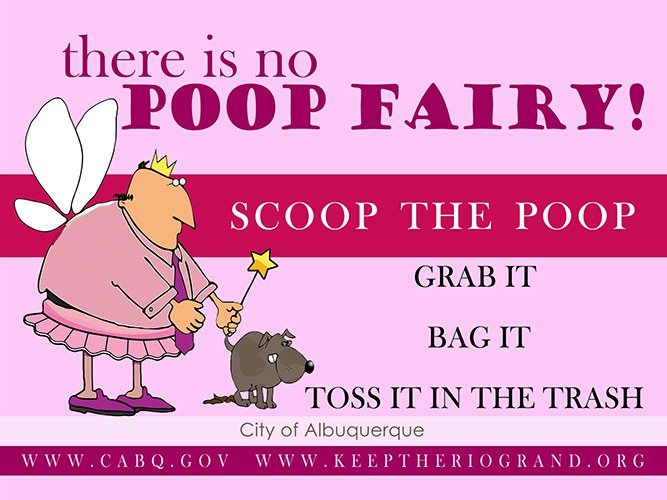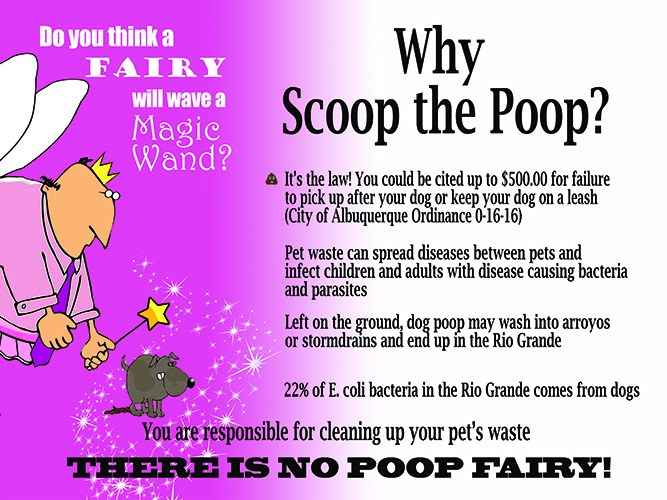Municipal Separate Storm Sewer System (MS4) Permit
Information about Municipal Separate Storm Sewer System (MS4) Permit.
Protection of the Rio Grande and improving our storm water quality is of paramount importance to the City of Albuquerque and a priority for the citizens that we serve. As a result the City has applied for and received a Watershed Based Municipal Separate Storm Sewer System (MS4) Permit.
The City of Albuquerque and its co-permittees are currently regulated by Environmental Protection Agency's (EPA) National Pollutant Discharge and Elimination System (NPDES) through the Watershed Based MS4 Permit. The City and its co-permitees received their first permit in 2003. The first five-year permit expired at the end of November 2008, the second MS4 permit and was replaced by the Watershed Based MS4 Permit in December 2014.
Under the new permit there are fourteen (14) co-permitees. The EPA believes that a WBP permit approach is more beneficial when it comes to enhancing the water quality in the Middle Rio Grande Watershed.
Minimum-Control Measures
The City's MS4 permit has requirements that fall within six (6) Minimum Control Measures (MCMs) that must be described and implemented in a Stormwater Management Program (SWMP). These are:
- Public Education and Outreach on Storm Water Impacts: Intended to educate the public of the potential for pollution and the benefits of improving the water quality in the Rio Grande.
- Public Involvement/Participation: Intended to identify various opportunities for the public to get involved in improving the water quality in the Rio Grande.
- Illicit Discharge Detection and Elimination: Program to find and eliminate non-storm water discharges that are sources of pollution that are harmful to the Rio Grande habitat.
- Construction Site Storm Water Runoff Control/ Industrial & High Risk Runoff Management: Monitor and minimize the release of pollutants, sediment, trash, and debris from construction sites during construction activities.
- Post-Construction Storm Water Management in New Development and Redevelopment including the implementation of Low Impact Development (LID) practices: Implement LID practices in an effort to reduce the amount of storm water runoff that can leave a site and enter the City's storm drainage system.
- Pollution Prevention/Good Housekeeping for Municipal Operations: Program to ensure that City facilities storm water controls/Best Management Practices (BMPs) are maintained and inspected on a regular basis. In addition, this program provides training to City employees on the best practices for daily maintenance and operations activities to minimize the introduction of various pollutants into the City's storm drain system.
Citizens Blue Ribbon Committee
In an effort to receive public input and share information about the City's MS4 permit a Citizen Blue Ribbon Committee was formed through the Mid-region Council of Governments (MRCOG). The Purpose of Committee was to discuss issues regarding compliance with the permit under the federal Clean Water Act, and to formulate recommendations for consideration by the MS4 co-permittees in order to effectively implement the Albuquerque stormwater management program in conformance with the EPA's six minimum measures.
Storm Water Management Section also provides guidance and training to local engineers, planners and contractors in the planning and implementation of storm water quality control measures for construction projects installed within the City of Albuquerque.
Campaign: Poop Fairy
View images for the City of Albuquerque's Poop Fairy campaign.
There is No Poop Fairy

Scoop the poop.
- Grab it
- Bag it
- Toss it in the trash
Why Scoop the Poop

Do you think a fairy will wave a magic wand?
- It's the law! You could be cited up to $500 for failure to pick up after your dog or keep your dog on a leash. (City of Albuquerque ordinance 0-16-16)
- Pet waste can spread diseases between pets and infect children and adults with disease-causing bacteria and parasites
- Twenty-two percent of E. coli bacterial in the Rio Grande comes from dogs
- You are responsible for cleaing up your pet's waste.
There is no Poop Fairy!
About the 'Poop Fairy' Campaign
The Poop Fairy image and campaign materials were provided by Greenville County Soil and Water Conservation District in South Carolina. Based on a Colorado Scoop the Poop effort, GCSWCD's campaign with the humorous fairy and tag line launched in 2011 and has continued to achieve national recognition.
For information, visit the Poop Fairy website.
If you would like a yard sign, please email [email protected].
Poop Fairy yard signs also are available for pick up at the N.M. Museum of Natural History & Science, 1801 Mountain NW, Albuquerque, NM 87104. Prior to pick up, please email [email protected]
MS4 FY25 Annual Report
Download the FY25 Annual Report
MS4 FY25 Draft Annual Report
Download the Draft FY25 MS4 Annual Report.
MS4 FY24 Annual Report
Download the FY24 MS4 Annual Report.
MS4 FY23 Annual Report
Download the FY23 MS4 Annual Report.
MS4 FY22 Annual Report
Download the FY22 MS4 Annual Report.
MS4 FY21 Annual Report
Download the FY21 MS4 Annual Report
MS4 FY20 Annual Report
Download the FY20 MS4 Annual Report
MS4 FY19 Annual Report
Download the FY19 MS4 Annual Report
MS4 FY18 Annual Report
Download the 2018 MS4 Annual Report
MS4 FY17 Annual Report
Download the 2017 MS4 Annual Report.
Stormwater Management Plans
Download the 2019 Stormwater Management Plan
MS4 Publications
For more information on the City's MS4 permit please reference the following documentation:
- City of Albuquerque Watershed Based MS4 Permit
- National Pollutant Discharge Elimination System Stormwater Program - MS4 Notice of Intent Format - May 19, 2015
- City of Albuquerque Storm Water Quality Ordinance
- Rainfall, Runoff and Water Quality Data Report for Albuquerque 2003-2004
- Rainfall, Runoff and Water Quality Data Report for Albuquerque 2002-2003
- Middle Rio Grande Microbial Source Tracking Report
- The AMAFCA/Albuquerque MS4 Floatable and Gross Pollutant Study
- MS4 Coverage Letter for COA
Storm Water Pollution Prevention Plans
The SWPP was developed to meet the requirements of both the City's Municipal Separate Storm Sewer Permit and the EPA's Multi-Sector General Permit for Storm Water Discharges associated with Industrial Activity.View the plans.
Annual Report 2016
April 2016 Update
- WY 2015 Report and Certification Statement
- Attachment 1 Bacterial Loading for WY2015
- Attachment 2 Chemical Loading and Even Means for WY 2015
- Attachment 3 Water Monitoring Status and Water Monitoring Results
- Water Quality Monitoring Results 1-13-16
- Water Quality Monitoring Status June-September 2015
- Water Quality Monitoring Status July 2014 to December 2014
- Attachment 4 Dry Weather Screening Results
- Attachment 5 Discharge Monitoring Reports
Documents
- National Pollutant Discharge Elimination System Stormwater Program
- Transitional Update for City of Albuquerque: NMS00101-NMR04A000
2014 Annual Report
- Cover Letter and Main Body
- Construction Site Runoff Controls
- Post Construction Stormwater Management
- Pollution Prevention Good Housekeeping for Municipal
- Industrial and High Risk Runoff
- Illicit Discharges and Improper Disposal
- Control of Floatables Discharges
- Waste Collection Programs
- Public Education and Outreach on Stormwater Impacts
- Public Involvement and Participation
- Implementation of New Bacteria TMDL
- Investigation and Reduction of PCBs
- Wet Weather Screening of MS4
- Wet Weather Assessment of Potential WQ Impacts
National Pollutant Discharge Elimination System Manual
View information about the National Pollutant Discharge Elimination System Manual.
